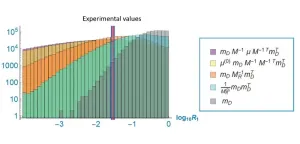(Press-News.org) PROVIDENCE, R.I. [Brown University] — While new drugs to treat Alzheimer’s disease tend to receive the most public attention, many well-researched ways to care for people with dementia don’t involve medication. A new evaluation compared the cost-effectiveness of four non-drug interventions to the usual care received by people with dementia and found that the interventions not only resulted in a better quality of life, but also saved money.
In a study published April 6 in Alzheimer's & Dementia: The Journal of the Alzheimer's Association, researchers used a computer simulation model to show that the four dementia-care interventions saved between $2,800 and $13,000 in societal costs, depending on the type of intervention, and all reduced nursing home admissions and improved quality of life compared to usual care.
Alzheimer’s drugs hold great promise, but they still need additional research and improvement, said lead study author Eric Jutkowitz, an associate professor at Brown University’s School of Public Health. In the meantime, he said, a number of non-drug interventions have been shown to be effective in clinical trials in improving quality of life for people with dementia and helping them stay safely at home longer.
“Now that we can show that these effective interventions can also save money, it just makes sense to find ways to make them available to more families,” Jutkowitz said. “These interventions can be used to help people with dementia starting today.”
The four interventions studied included the following: Maximizing Independence at Home, an at-home, care coordination intervention that consists of care planning, skill-building, referrals to services and care monitoring; New York University Caregiver, which is implemented in an outpatient clinic and provides caregivers with six counseling sessions over four months plus lifetime ad-hoc support and access to weekly support groups; Alzheimer’s and Dementia Care, in which a health care system provides people living with dementia and their caregivers a needs assessment, individual care plans and round-the-clock access to a care manager; and Adult Day Service Plus, which augments adult day care services with staff providing face-to-face caregiver support, disease education, care management, skill-building and resource referrals.
Nonpharmacological interventions like these provide family caregivers with knowledge, skills and support tailored to their care challenges. They have been shown to improve quality of life for the caregiver and the person living with dementia, as well as to reduce nursing home admissions, and they are not associated with adverse events such as hospitalizations and mortality. For these reasons, nonpharmacological interventions are recommended as first-line therapies for the management of Alzheimer’s and dementia.
While non-drug interventions are well-studied, Jutkowitz said they haven't been widely implemented in clinical care centers. He added that there isn’t currently an infrastructure in place to support these methods of care — for example, there are limited mechanisms for providers to be reimbursed for these types of interventions.
To conduct the study, the researchers used a computer simulation to model the likelihood of nursing home admission for four evidence-based Alzheimer’s and dementia nonpharmacological interventions compared to usual care. For each, the study evaluated societal costs, quality-adjusted life-years and cost-effectiveness. The inputs in the simulation were based on data from Medicare, clinical trials and national surveys with families of people with dementia.
Jutkowitz noted that the researchers benefited not only from Brown University computing resources that could handle intensive analytic tasks, but also access to data from the government’s Centers for Medicare and Medicaid Services, which was crucial to the analysis.
In addition to finding that the interventions were cost-effective from a societal perspective, the researchers also found that from a health care payer perspective, the interventions involved little to no additional cost, compared to usual care, while increasing patient quality of life.
Based on the study findings, the authors concluded that health insurance policies should find ways to incentivize providers and health systems to implement nonpharmacological interventions.
The importance of understanding the cost-effectiveness of non-drug Alzheimer’s and dementia interventions is further highlighted by changes in Medicare payment models and emerging Alzheimer’s therapeutics, the researchers noted. The Centers for Medicare and Medicaid Services is in the process of determining coverage for new Alzheimer’s and related dementia drugs.
“As the Centers for Medicare and Medicaid Services determine coverage for new Alzheimer’s and related dementia drugs, we strongly believe that CMS should also consider the benefits of nonpharmacologic interventions,” Jutkowitz said.
While this study focused on non-drug interventions that reduce nursing home admissions, a future analysis will look at similar interventions that reduce or maintain functional decline and challenging behaviors. The researchers are also working on designing a trial that would test the interventions with patients in a health care setting.
Additional Brown contributors included Peter Shewmaker and Gary Epstein-Lubow.
This research was supported by the National Institute on Aging (1R21AG059623-01, 1R01AG060871-01, 1RF1AG069771, R01AG049692).
END
Non-drug interventions for patients with Alzheimer’s are both effective and cost-effective, study shows
A Brown-led research team used a computer simulation to show that compared to usual care, four dementia-care interventions saved up to $13,000 in costs, reduced nursing home admissions and improved quality of life.
2023-04-06
ELSE PRESS RELEASES FROM THIS DATE:
Moving towards 3 degrees of warming – the phasing out of coal is too slow
2023-04-06
The use of coal power is not decreasing fast enough. The Paris Agreement’s target of a maximum of 2 degrees of warming appear to be missed, and the world is moving towards a temperature increase of 2.5–3 degrees. At the same time it is feasible to avoid higher warming. This is shown by researchers from Chalmers University of Technology and Lund University, Sweden, in a new study.
“More and more countries are promising that they will phase out coal from their energy systems, which is positive. But ...
Newly discovered probiotic could protect Caribbean corals threatened by deadly, devastating disease
2023-04-06
Researchers with the Smithsonian’s National Museum of Natural History have discovered the first effective bacterial probiotic for treating and preventing stony coral tissue loss disease (SCTLD), a mysterious ailment that has devastated Florida’s coral reefs since 2014 and is rapidly spreading throughout the Caribbean.
The probiotic treatment, described in a paper published today in Communications Biology, provides an alternative to the use of the broad-spectrum antibiotic amoxicillin, which has so far been the only proven treatment for the disease but which runs the risk of promoting antibiotic-resistant bacteria.
SCTLD ...
Significant step in fight against drug resistance in TB
2023-04-06
University of Otago researchers have discovered new ways to treat antibiotic-resistant strains of tuberculosis (TB), opening the door to new approaches for tackling the disease that kills about 4,000 people a day.
Led by PhD candidate Natalie Waller and Senior Author Dr Matthew McNeil, of the Department of Microbiology and Immunology, researchers were able to identify antibiotics that could rapidly kill drug resistant strains of TB and when combined could stop drug resistance from occurring altogether.
TB is a major global cause of infectious disease morbidity and mortality, second only to COVID-19 and is one of the hardest infections to treat. ...
Pancreatic lesions may occur more frequently than previously thought
2023-04-06
Bottom Line: Pancreatic intraepithelial neoplasia (PanIN) lesions were detected in a majority of healthy pancreata from deceased donors of diverse age and harbored features of pancreatic cancer.
Journal in Which the Study was Published: Cancer Discovery, a journal of the American Association for Cancer Research
Authors: Marina Pasca di Magliano, PhD, co-corresponding author of the study, a researcher at the Rogel Cancer Center, and a professor of surgery and of cell and developmental biology at Michigan Medicine at the University of Michigan
Timothy Frankel, MD, co-corresponding author, a researcher at the Rogel Cancer Center, and an ...
People with obesity due to genetic predisposition have lower risk of cardiovascular disease
2023-04-06
The risk of developing cardiovascular disease is lower in people with obesity who have a genetic predisposition for high BMI than people with obesity influenced mainly by environmental factors such as lifestyle, researchers from Karolinska Institutet report in eClinicalMedicine.
There has been a global increase in the incidence of overweight and obesity over the past few years. Almost one third of the world’s population now lives with overweight or obesity.
“The figure is alarming since it is well-established that a high BMI in middle-age increases the risk of developing ...
Obstructive sleep apnea may directly cause early cognitive decline
2023-04-06
Obstructive sleep apnea (OSA) is a potentially dangerous condition. During sleep, the throat muscles of people with OSA relax and block the airflow into the lungs, so that they repeatedly stop breathing. Common symptoms of OSA include restless sleep, loud snoring, daytime sleepiness, and prolonged headaches in the morning – highly debilitating for patients and their partners.
OSA is currently underdiagnosed: it may occur in as much as 15 to 30% of men and 10 to 15% of women, or approximately 1bn adults worldwide, of whom an estimated 80% don’t know they have it. Major risk factors for OSA include middle or old age, being obese, smoking, ...
Random matrix theory approaches the mystery of the neutrino mass!
2023-04-06
When any matter is divided into smaller and smaller pieces, eventually all you are left with—when it cannot be divided any further—is a particle. Currently, there are 12 different known elementary particles, which in turn are made up of quarks and leptons each of which come in six different flavors. These flavors are grouped into three generations—each with one charged and one neutral lepton—to form different particles, including the electron, muon, and tau neutrinos. In the Standard Model, the masses of the three generations of neutrinos are represented by a three-by-three ...
Lab-grown fat could give cultured meat real flavor and texture
2023-04-06
Researchers at Tufts University have successfully bulk-produced fat tissue in the lab that has a similar texture and make-up to fat tissue naturally occurring in animals. The results, described in a study published today in eLife, could be applied to the production of cultured meat grown entirely from cells, giving it a more realistic texture and flavor.
Startup companies around the world are developing cultivated meat—cell-grown chicken, beef, pork, and fish. Most are in early stages of development, not ready for large-scale production and, with a ...
Disruption from war in Ukraine pushes highly contagious infectious diseases to alarming levels
2023-04-06
Analysis of official Ukraine health data reveals a perfect storm of rising infectious diseases cases and falling levels of childhood vaccination and case detection in the frontline eastern region of Kharkiv.
Between January and September 2022, new cases of rubella were 23 times higher among children living in the Kharkiv region than average rates across Ukraine, while shigellosis (diarrhoeal disease) and viral meningitis incidence was around 6 times higher, and whooping cough 5 times greater.
But registration of infectious disease cases halved in Kharkiv ...
Air pollution may increase risk for dementia
2023-04-06
Key points:
This meta-analysis, which includes the most recent studies evaluating the link between air pollution and dementia, is the first to include studies based on active case ascertainment and to evaluate studies using a new, more powerful bias assessment tool.
The findings support the public health importance of a proposal, currently under consideration by the Environmental Protection Agency, to strengthen regulations on PM2.5
Boston, MA—Exposure to fine particulate air pollutants (PM2.5) may increase the risk of developing dementia, according to a new meta-analysis from Harvard T.H. Chan School of Public Health.
“This is a big step in providing actionable ...
LAST 30 PRESS RELEASES:
ASU researchers to lead AAAS panel on water insecurity in the United States
ASU professor Anne Stone to present at AAAS Conference in Phoenix on ancient origins of modern disease
Proposals for exploring viruses and skin as the next experimental quantum frontiers share US$30,000 science award
ASU researchers showcase scalable tech solutions for older adults living alone with cognitive decline at AAAS 2026
Scientists identify smooth regional trends in fruit fly survival strategies
Antipathy toward snakes? Your parents likely talked you into that at an early age
Sylvester Cancer Tip Sheet for Feb. 2026
Online exposure to medical misinformation concentrated among older adults
Telehealth improves access to genetic services for adult survivors of childhood cancers
Outdated mortality benchmarks risk missing early signs of famine and delay recognizing mass starvation
Newly discovered bacterium converts carbon dioxide into chemicals using electricity
Flipping and reversing mini-proteins could improve disease treatment
Scientists reveal major hidden source of atmospheric nitrogen pollution in fragile lake basin
Biochar emerges as a powerful tool for soil carbon neutrality and climate mitigation
Tiny cell messengers show big promise for safer protein and gene delivery
AMS releases statement regarding the decision to rescind EPA’s 2009 Endangerment Finding
Parents’ alcohol and drug use influences their children’s consumption, research shows
Modular assembly of chiral nitrogen-bridged rings achieved by palladium-catalyzed diastereoselective and enantioselective cascade cyclization reactions
Promoting civic engagement
AMS Science Preview: Hurricane slowdown, school snow days
Deforestation in the Amazon raises the surface temperature by 3 °C during the dry season
Model more accurately maps the impact of frost on corn crops
How did humans develop sharp vision? Lab-grown retinas show likely answer
Sour grapes? Taste, experience of sour foods depends on individual consumer
At AAAS, professor Krystal Tsosie argues the future of science must be Indigenous-led
From the lab to the living room: Decoding Parkinson’s patients movements in the real world
Research advances in porous materials, as highlighted in the 2025 Nobel Prize in Chemistry
Sally C. Morton, executive vice president of ASU Knowledge Enterprise, presents a bold and practical framework for moving research from discovery to real-world impact
Biochemical parameters in patients with diabetic nephropathy versus individuals with diabetes alone, non-diabetic nephropathy, and healthy controls
Muscular strength and mortality in women ages 63 to 99
[Press-News.org] Non-drug interventions for patients with Alzheimer’s are both effective and cost-effective, study showsA Brown-led research team used a computer simulation to show that compared to usual care, four dementia-care interventions saved up to $13,000 in costs, reduced nursing home admissions and improved quality of life.



